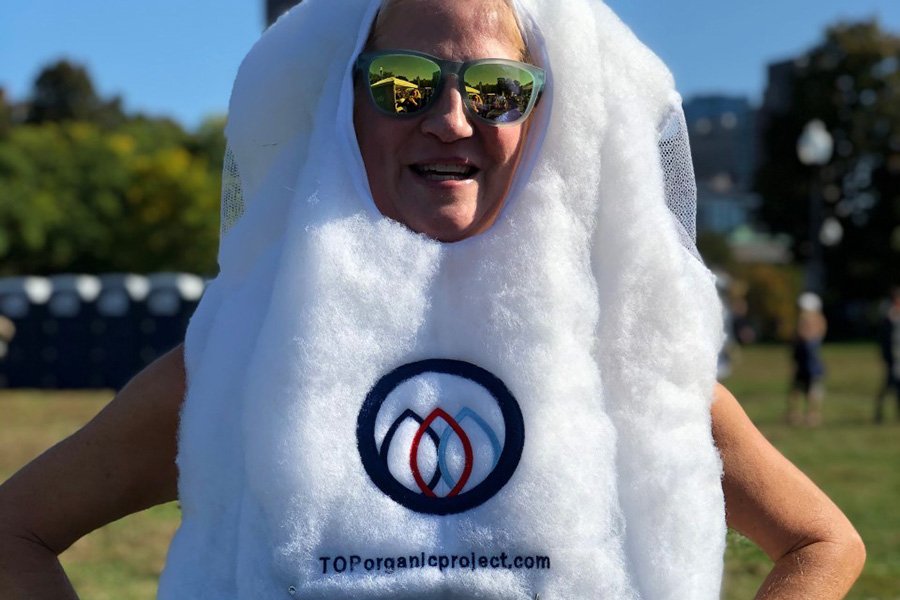Why One Woman Ran a Boston 10k Dressed as a Tampon
The co-founders of the feminine hygiene product company TOP (The Organic Project) are demanding ingredient transparency from other companies and to end the taboo around periods.

Photo provided
The average American woman will use more than 12,000 tampons in her life and spend approximately $11,000 on feminine hygiene products alone. In cities across the United States low-income women regularly have to choose between food and period products.
Thyme Sullivan, who dressed as a tampon for the Reebok 10k in Boston this past Monday, is working to flip this script. “Because as long as the stigma still exists and the Tampon Tax is in place, we will never have female equality,” she says. She trotted through the race, bright-eyed and smiling with a tampon string dangling between her legs, greeted by cheers from the crowd—because periods aren’t embarrassing, they’re beautiful.
Sullivan, along with her cousin Denielle Finkelstein, founded TOP, The Organic Project, back in January to make better and safer feminine hygiene products more accessible to all women. The Duxbury-based company offers organic and eco-friendly cotton tampons, pads, and liners online through their website and will be rolling out product offerings in local grocery stores. They also donate products to girls and women who need them by partnering with other like-minded companies like The Penny Pack, Girlology, EmpowerHER, and Period.org.
Massachusetts is one of 12 states that doesn’t have a Tampon Tax. But that leaves 35 states that still treat feminine hygiene products as a luxury taxed good, while things like Viagra and condoms go un-taxed.
Along with trying to make tampons and pads more affordable, TOP’s mission hinges on helping women understand the importance of knowing exactly what is going into the most intimate part of their body.
“I’ve asked women in Whole Foods, carrying baskets overflowing with organic products, about their feminine care,” Sullivan says. “And they tell me they don’t think about it. It’s about education.”
When companies like TOP make better and safer products readily available in mainstream retailers, Sullivan explains it begins to force bigger companies that control the market to disclose their ingredients and to emphasize women’s health above corporate greed. Whereas other products may contain chemicals, such as dioxins, or dyes, TOP’s tampons and pads are all hypoallergenic, USDA-certified organic, and completely biodegradable.
With two young daughters between the two of them, the entrepreneurs and mothers left their corporate executive jobs to make an impact on the next generation, and to ensure places like schools and offices have feminine hygiene products readily available. For every purchase of TOP products, the company donates tampons and pads to schools and organizations throughout New England.
“Half the population is getting their period,” Finkelstein says. “And unfortunately, due to the taboo and inaccessibility to products, young girls are missing school and extracurricular activities like sports and theatre. We have to keep moving the narrative. You can do anything with your period.”
While Sullivan and Finkelstein may be providing the platform for change, they say Generation Z is mobilizing it. “They’re crushing it,” Sullivan says. Their daughters are bringing bags of TOP tampons and pads to school, they’re gushing over the TOP YouTube channel where Sullivan and Finkelstein post videos of them doing things like yoga and lifting weights in the tampon suit, and they want to be a part of the change.
“It erases the taboo when you make fun of it,” Sullivan adds. “Seeing strong women helping each other is empowering and you can be a role model because the younger generation is open to it. They are in it to win it. They aren’t waiting for anyone to give them the okay.”
Just look to Gen Z-er Nadya Okamato, who founded Period.org, a 501(c)(3) non-profit, to eliminate period poverty and stigma, when she was just 16 and living in Portland, Oregon. The now 21-year-old Harvard student is something of a national sensation and has organized the first ever National Period Day on October 19 with rallies in all 50 states. Become a part of the movement by signing the petition to end period poverty and join the Boston rally at City Hall Plaza on Saturday at 3 p.m.
“It’s about educating and empowering women to speak up,” Sullivan says. “It’s a real thing when women get outraged.” And it’s a real thing when women get outraged and work together. There is strength in numbers.
For more information: toporganicproject.com.


